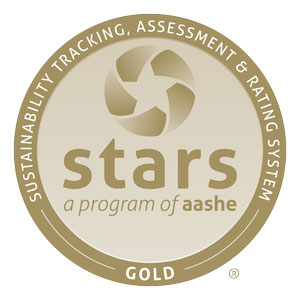 Four years of innovative projects and collaborative action planning have upgraded McGill’s rating in sustainability to Gold in the newest version of the Sustainability Tracking, Assessment and Rating System (STARS).
Four years of innovative projects and collaborative action planning have upgraded McGill’s rating in sustainability to Gold in the newest version of the Sustainability Tracking, Assessment and Rating System (STARS).
Among other achievements, the increasing integration of sustainability in curriculum, research, dining services, and purchasing helped McGill achieve Gold. The last time McGill reported to STARS, a self-reported assessment tool developed by the Association for the Advancement of Sustainability in Higher Education (AASHE), in 2012, it earned a silver rating.
“Sustainability is a growing focus for teaching and research at McGill,” said Provost Christopher Manfredi. “Our faculty and students are leading the way in creative, interdisciplinary research that addresses the most complex sustainability challenges of our time. This gold rating demonstrates the passion and commitment to sustainability on our campuses.”
Lesley Johnson, the Sustainability Monitoring & Reporting Intern with the McGill Office of Sustainability who helped complete the STARS report explains that this latest version of STARS is the most rigorous and representative system yet. “The STARS report is comprised of over 70 credits, each credit measuring a unique facet of the university’s overall sustainability performance. To complete it, the Office had to collect over 1000 data points from responsible parties across 15 units.”
Many of the improvements reflected in the current score were mandated by McGill’s own Sustainability Strategy, Vision 2020. Launched in 2014, the Strategy was developed by and for the McGill community and sought to increase sustainability in many of the same areas assessed by STARS: Research, Education, Operations, Connectivity, and Governance and Administration.
“We could not have achieved a gold rating without the coordination and strategic direction provided by Vision 2020,” remarked Francois Miller, Director of the McGill Office of Sustainability. “This will only strengthen our resolve to further integrate sustainability into the university’s institutional fabric. The Vision 2020 Action Planning process will help us get there.”
This past Friday, the Office of Sustainability kicked off the start of a new action planning phase for Vision 2020. The Office is gathering key stakeholders at McGill into action teams that will set and implement priority actions to address sustainability and climate change challenges at the University.
Highlights of McGill’s sustainability efforts and accomplishments include:
- The Sustainability Projects Fund (SPF) – the largest dedicated campus sustainability fund of its kind in North America, the SPF has awarded over $5 million to 155 projects since its creation in 2010. All projects have yielded dramatic and lasting improvements to McGill’s sustainability performance. 85 per cent of approved projects have demonstrated collaboration between students and staff.
- Sustainability in the curriculum – Students across McGill are digging into sustainability through their coursework. They may choose to do it in the McGill School of Environment, in the joint interfaculty BA & Sc program in Sustainability, Science and Society, in the Trottier Institute for Sustainability in Engineering and Design, or in the BCom in Managing for Sustainability.
- Sustainable food sourcing – McGill is a pioneer of sustainable food sourcing, purchasing over 30,000 kilos of produce, 3,000 kilos of beef, and 135,000 eggs annually form the Macdonald Campus Farm to serve in dining halls. McGill is the first university in Canada to be certified by the Marine Stewardship Council for sustainable seafood, and the first in Quebec to become a Fair Trade Campus.
- Energy conservation – McGill has invested approximately $19.1 million in energy-saving projects and reduced its absolute greenhouse gas emissions (from stationary combustion) by 34 per cent from 1990 levels.
- Procurement Services – McGill has won two international awards for its Sustainable Procurement Strategy and has recently enacted a Supplier Code of Conduct.
For more information, read McGill’s full AASHE STARS Report.
